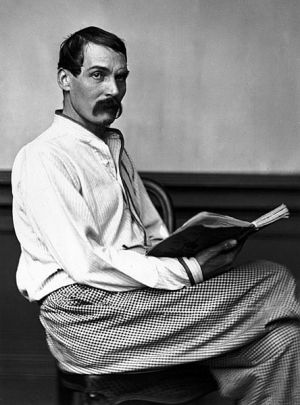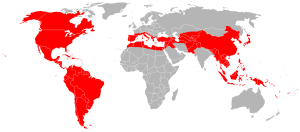Sir Richard Burton

Sir Richard Francis Burton KCMG FRGS (19 March 1821 – 20 October 1890) was a British explorer, writer, orientalist scholar,[1] and soldier. He was famed for his travels and explorations in Asia, Africa, and the Americas, as well as his extraordinary knowledge of languages and cultures. According to one count, he spoke twenty-nine languages.[2] Burton's best-known achievements include: a well-documented journey to Mecca in disguise, at a time when non-Muslims were forbidden access on pain of death; an unexpurgated translation of One Thousand and One Nights (commonly called The Arabian Nights in English after early translations of Antoine Galland's French version); the publication of the Kama Sutra in English; a translation of The Perfumed Garden, the "Arab Kama Sutra"; and a journey with John Hanning Speke as the first Europeans to visit the Great Lakes of Africa in search of the source of the Nile.
His works and letters extensively criticised colonial policies of the British Empire, even to the detriment of his career. Although he aborted his university studies, he became a prolific and erudite author and wrote numerous books and scholarly articles about subjects including human behaviour, travel, falconry, fencing, sexual practices, and ethnography. A characteristic feature of his books is the copious footnotes and appendices containing remarkable observations and information. William Henry Wilkins wrote: "So far as I can gather from all I have learned, the chief value of Burton’s version of The Scented Garden lay not so much in his translation of the text, though that of course was admirably done, as in the copious notes and explanations which he had gathered together for the purpose of annotating the book. He had made this subject a study of years. For the notes of the book alone he had been collecting material for thirty years, though his actual translation of it only took him eighteen months."[3]
Burton was a captain in the army of the East India Company, serving in India, and later briefly in the Crimean War. Following this, he was engaged by the Royal Geographical Society to explore the east coast of Africa, where he led an expedition guided by locals and was the first European known to have seen Lake Tanganyika. In later life, he served as British consul in Fernando Pó (now Bioko, Equatorial Guinea), Santos in Brazil, Damascus (now Syria), and finally in Trieste (now Italy).[4] He was a Fellow of the Royal Geographical Society and was awarded a knighthood in 1886.[5]
Interest to MAPs
Burton’s interest in sex and sexuality would lead him to create, together with Forster Fitzgerald Arbuthnot, the Kama Shastra Society to privately circulate books among its members and thus circumvent the ban on erotic literature under the Obscene Publications Act of 1857. His interest in sexuality is reflected in the frank and open manner such topics are discussed in his writings, as well as him taking phallic measurements of various men, as well as describing sexual techniques in the regions that he visited, often hinting that he partook in it. It’s unclear whether Burton engaged in homosexuality, although unfounded rumours on it circulated since his army days. In his essay, “pederasty”, Burton praises pederasty as “one of the marvellous lists of amorous vagaries” and apparently condemns it as “pathological love” which “deserved not prosecution but the pitiful care of the physician and the study of the psychologist.”. But it should be noted that, to evade the increasing British censorship in the late 19th century, Burton often employed irony, humour and use foreign languages to fool many of the censors, which could be why he writes contradictory statements on pederasty throughout his essay.
The Sotadic zone

Derived from Sotades (a 3rd-century BC ancient Greek poet renowned for being chief of a group of writers of obscene, satirical and, at times, pederastic poetry) the Sotadic zone (map shown on the right) was theorised by Burton as being a geo-climatic zone in which pederasty and sodomy are endemic, prevalent, and celebrated among the indigenous peoples and their culture.[6][7] He first advanced it the closing essay of his English translation of The Arabian Nights, titled “pederasty”. The zone encompasses all the Americas, the Mediterranean coastlines of Southern Europe and north Africa, huge swaths of west and central Asia, as well as all east and south-east Asia.
References
- ↑ de la Fuente, Ariel (2018). "Sir Richard Burton's Orientalist Erotica". Borges, Desire, and Sex. Liverpool University Press. pp. 84–108. doi:10.2307/j.ctvhn09p9.9. ISBN 9781786941503. JSTOR j.ctvhn09p9.9. S2CID 239794503.
- ↑ Young, S. (2006). "India". Richard Francis Burton: Explorer, Scholar, Spy. New York: Marshall Cavendish. pp. 16–26. ISBN 9780761422228.
- ↑ Burton, I.; Wilkins, W. H. (1897). The Romance of Isabel Lady Burton. The Story of Her Life. New York: Dodd Mead & Company. Archived from the original on 29 January 2018. Retrieved 28 January 2018.
- ↑ Paxman, Jeremy (1 May 2015). "Richard Burton, Victorian explorer". www.ft.com. Archived from the original on 10 December 2022. Retrieved 12 February 2021.
- ↑ "Historic Figures: Sir Richard Burton". BBC. Retrieved 7 April 2017
- ↑ Reyes, Raquel A. G. (2012). "Introduction". In Reyes, Raquel A. G.; Clarence-Smith, William G. (eds.). Sexual Diversity in Asia, c. 600–1950. Routledge contemporary Asia series. Vol. 37. Abingdon, Oxfordshire: Routledge. pp. 1–3. ISBN 978-0-415-60059-0.
- ↑ Markwell, Kevin (2008). "The Lure of the "Sotadic Zone"". The Gay & Lesbian Review Worldwide. 15 (2). Excerpted and reprinted with permission from Waitt, Gordon; Markwell, Kevin (2006). Gay Tourism: Culture and Context. New York City: Haworth Press. ISBN 978-0-7890-1602-7.